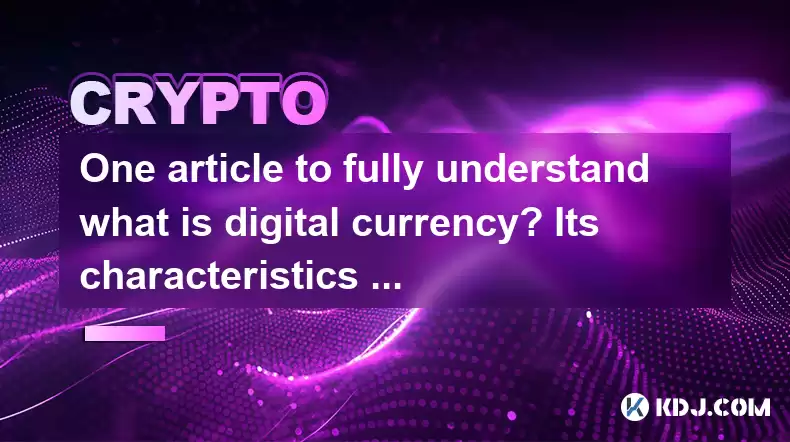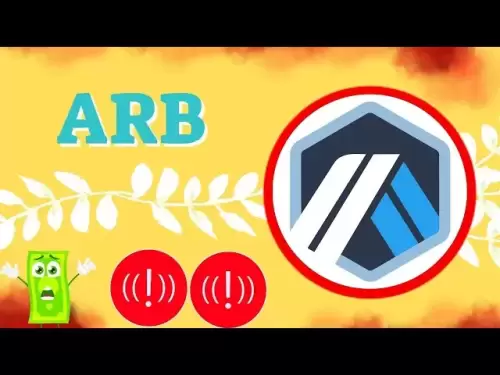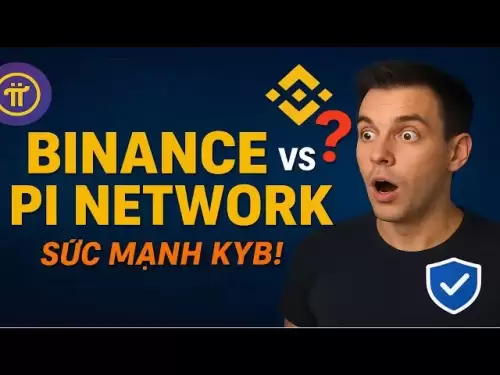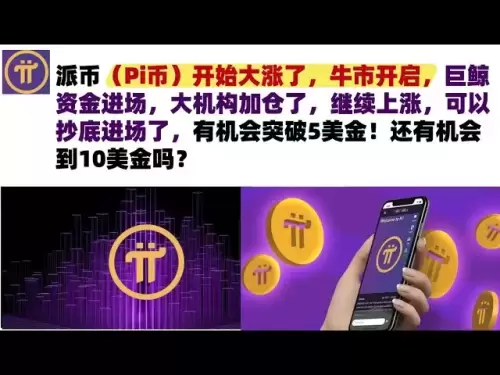-
 Bitcoin
Bitcoin $116600
0.11% -
 Ethereum
Ethereum $4235
4.72% -
 XRP
XRP $3.283
0.22% -
 Tether USDt
Tether USDt $1.000
0.00% -
 BNB
BNB $805.4
1.59% -
 Solana
Solana $181.8
2.27% -
 USDC
USDC $0.9998
-0.01% -
 Dogecoin
Dogecoin $0.2450
7.90% -
 TRON
TRON $0.3363
-0.80% -
 Cardano
Cardano $0.8161
2.85% -
 Hyperliquid
Hyperliquid $43.68
6.68% -
 Chainlink
Chainlink $21.20
8.50% -
 Stellar
Stellar $0.4526
0.64% -
 Sui
Sui $3.949
3.12% -
 Bitcoin Cash
Bitcoin Cash $571.3
-2.83% -
 Hedera
Hedera $0.2656
1.45% -
 Avalanche
Avalanche $24.41
3.14% -
 Ethena USDe
Ethena USDe $1.001
0.03% -
 Litecoin
Litecoin $122.0
-2.03% -
 Toncoin
Toncoin $3.425
1.51% -
 UNUS SED LEO
UNUS SED LEO $9.004
0.19% -
 Shiba Inu
Shiba Inu $0.00001381
4.36% -
 Uniswap
Uniswap $10.93
0.05% -
 Polkadot
Polkadot $4.117
3.93% -
 Dai
Dai $1.000
0.02% -
 Pepe
Pepe $0.00001235
3.53% -
 Bitget Token
Bitget Token $4.507
0.36% -
 Cronos
Cronos $0.1570
2.05% -
 Monero
Monero $274.9
0.14% -
 Ethena
Ethena $0.7511
15.68%
One article to fully understand what is digital currency? Its characteristics and future development trends
Digital currency introduces enhanced security, faster transactions, and accessibility for the unbanked, leveraging blockchain technology for secure and transparent record-keeping.
Feb 06, 2025 at 02:54 pm

One Article to Fully Understand What is Digital Currency? Its Characteristics and Future Development Trends
Key Points
- Digital currency: definition, types, and characteristics
- Blockchain technology and its role in digital currencies
- Mining and its importance in the cryptocurrency ecosystem
- Cryptocurrency exchanges and their functions
- Security considerations for digital currency users
- Future trends and potential of digital currencies
Understanding Digital Currency
- Digital currency refers to any form of currency that exists solely in digital or electronic form and is not backed by any physical asset.
- There are numerous types of digital currencies, including cryptocurrencies like Bitcoin and Ethereum, stablecoins like Tether and USD Coin, and central bank digital currencies (CBDCs) like the digital yuan.
- Digital currencies offer advantages such as increased security, faster transactions, lower transaction fees, and accessibility for unbanked populations.
Blockchain Technology in Digital Currencies
- Blockchain technology serves as the foundation for many cryptocurrencies and is a distributed, immutable ledger that records transactions and data securely and transparently.
- Each block in the blockchain contains a cryptographic hash of the previous block, creating an unbreakable chain of records that prevents tampering with past transactions.
- Blockchain technology enhances security by ensuring that digital currency transactions cannot be reversed or double-spent.
Mining Process
- Mining is the process of validating and adding new transaction records to the blockchain network.
- Miners use specialized computers to solve complex mathematical problems and compete for the right to add the next block to the blockchain.
- The successful miner receives a reward in the form of cryptocurrency in recognition of their work.
- Mining plays a crucial role in securing the blockchain network by verifying transactions and preventing malicious activity.
Cryptocurrency Exchanges
- Cryptocurrency exchanges are online platforms where investors can buy, sell, and trade digital currencies.
- Exchanges provide liquidity to the market and allow users to easily convert cryptocurrencies to fiat currencies and vice versa.
- Users should carefully consider factors such as trading fees, security measures, and supported currencies when selecting a cryptocurrency exchange.
Security and Risk Management
- Digital currency users must prioritize security measures to protect their digital assets from theft or loss.
- This includes using secure passwords, enabling two-factor authentication, and storing cryptocurrencies in hardware wallets or cold storage devices.
- Users should also be aware of potential scams and fraudulent activities within the cryptocurrency ecosystem.
Future Development Trends
- The future of digital currencies appears promising, with increasing adoption by businesses, governments, and individuals.
- Central bank digital currencies (CBDCs) are gaining traction as nations explore the benefits of digitalizing their currencies.
- Layer-2 solutions like the Lightning Network are being developed to address scalability issues and improve transaction speed.
- Digital currencies are likely to play a significant role in global finance and economic development going forward.
FAQs
Q: What is the difference between a cryptocurrency and a stablecoin?
A: Cryptocurrencies like Bitcoin are decentralized and have volatile values, while stablecoins like Tether are pegged to a fiat currency like the US dollar and offer price stability.
Q: Is it possible for digital currencies to replace traditional fiat currencies?
A: While it is difficult to predict the future, digital currencies have the potential to supplement and coexist with traditional fiat currencies in the future.
Q: How can I ensure the security of my digital currency assets?
A: Implement strong security measures such as using secure passwords, enabling two-factor authentication, and storing cryptocurrencies in hardware wallets or cold storage devices.
Q: What is the future potential of digital currencies?
A: Digital currencies are expected to experience continued growth and adoption, with the development of new technologies and applications unlocking their full potential.
Q: What are the risks associated with investing in digital currencies?
A: Digital currencies can be highly volatile, and their value can fluctuate significantly in both directions. Investors should exercise caution and conduct thorough research before investing.
Disclaimer:info@kdj.com
The information provided is not trading advice. kdj.com does not assume any responsibility for any investments made based on the information provided in this article. Cryptocurrencies are highly volatile and it is highly recommended that you invest with caution after thorough research!
If you believe that the content used on this website infringes your copyright, please contact us immediately (info@kdj.com) and we will delete it promptly.
- Solana Meme Coin Presales: Hype or the Next Big Thing?
- 2025-08-10 02:50:12
- Pi Network, Altcoin Season, and Breakout Tokens: What's Hot in 2025?
- 2025-08-10 02:50:12
- Decoding Crypto Presales: Is Cold Wallet the New Neo Pepe?
- 2025-08-10 02:30:12
- Cryptos, 2025, Market Caps: Riding the Next Wave
- 2025-08-10 02:30:12
- Trump, Crypto Vehicle, and WLFI Tokens: A New York Minute on the Latest Buzz
- 2025-08-10 00:30:12
- Wheat Penny Fortune: Unearthing Valuable Coins in Your Pocket Change
- 2025-08-10 00:35:19
Related knowledge

What is Ethereum’s Slashing mechanism and how to punish malicious behavior?
Feb 20,2025 at 03:08am
Key PointsOverview of slashingDifferent types of slashing in EthereumIncentives and consequences of slashingIdentifying and reporting slashed validato...

What is the verifier node of Ethereum and how to become a verifier?
Feb 19,2025 at 06:00pm
The Verifier Node of Ethereum: A Comprehensive GuideKey Points:What is a Verifier Node?How to Become a Verifier NodeResponsibilities and Rewards of a ...

What is Ethereum’s staking, and how to participate and earn money?
Feb 19,2025 at 04:37pm
Key Points:Understanding Ethereum's Staking MechanismSteps to Participate in StakingBenefits and Rewards of StakingSecurity and Risk ConsiderationsTec...

What is Ethereum’s DAO (Decentralized Autonomous Organization) and how does it work?
Feb 20,2025 at 03:12am
Key PointsDefinition and Structure of a DAOGovernance and Decision-Making in DAOsBenefits and Use Cases of DAOsChallenges and Limitations of DAOsWhat ...

What is Ethereum's multi-signature wallet and how to improve security?
Feb 20,2025 at 02:18pm
Key Points:Understanding the Concept of a Multi-Signature WalletBenefits and Drawbacks of Multisig WalletsRequirements for Setting Up a Multisig Walle...

What is Ethereum's oracle and how to provide data for smart contracts?
Feb 21,2025 at 01:30am
Key Points:Understanding the concept of oracles in EthereumExploring different types of oraclesDetailed guide on how to provide data for smart contrac...

What is Ethereum’s Slashing mechanism and how to punish malicious behavior?
Feb 20,2025 at 03:08am
Key PointsOverview of slashingDifferent types of slashing in EthereumIncentives and consequences of slashingIdentifying and reporting slashed validato...

What is the verifier node of Ethereum and how to become a verifier?
Feb 19,2025 at 06:00pm
The Verifier Node of Ethereum: A Comprehensive GuideKey Points:What is a Verifier Node?How to Become a Verifier NodeResponsibilities and Rewards of a ...

What is Ethereum’s staking, and how to participate and earn money?
Feb 19,2025 at 04:37pm
Key Points:Understanding Ethereum's Staking MechanismSteps to Participate in StakingBenefits and Rewards of StakingSecurity and Risk ConsiderationsTec...

What is Ethereum’s DAO (Decentralized Autonomous Organization) and how does it work?
Feb 20,2025 at 03:12am
Key PointsDefinition and Structure of a DAOGovernance and Decision-Making in DAOsBenefits and Use Cases of DAOsChallenges and Limitations of DAOsWhat ...

What is Ethereum's multi-signature wallet and how to improve security?
Feb 20,2025 at 02:18pm
Key Points:Understanding the Concept of a Multi-Signature WalletBenefits and Drawbacks of Multisig WalletsRequirements for Setting Up a Multisig Walle...

What is Ethereum's oracle and how to provide data for smart contracts?
Feb 21,2025 at 01:30am
Key Points:Understanding the concept of oracles in EthereumExploring different types of oraclesDetailed guide on how to provide data for smart contrac...
See all articles

























































































